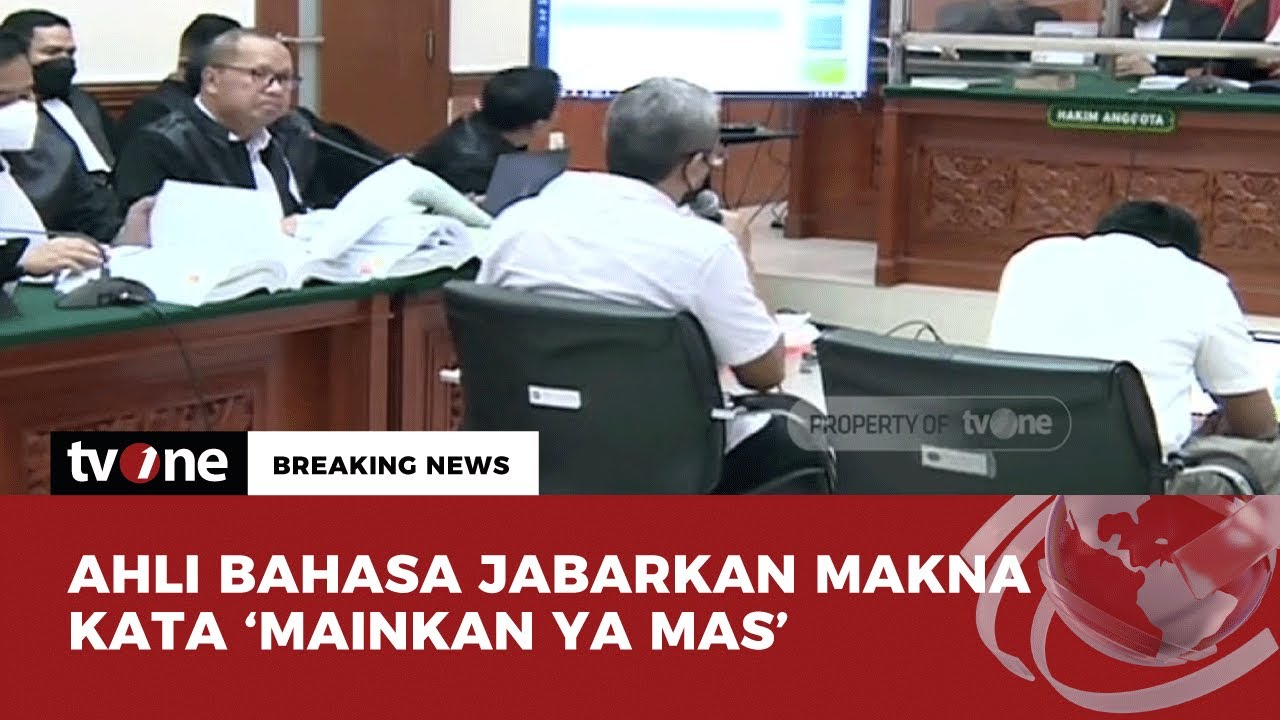Ahli Bahasa: "Mainkan, Minimal 1/4 " Adalah Kalimat Perintah | Breaking News Tvone
Unleash Your Creative Genius with MuseMind: Your AI-Powered Content Creation Copilot. Try now! 🚀
As I delved into the conversation between the high-ranking officials, my curiosity was piqued by the phrases they used. The main focus seemed to be on issuing commands and receiving responses. It made me wonder, do these sentences still contain explicit orders from superiors to subordinates?
Let's break it down.
The Power of Words
The first command, "mainkan ya Mas" (play it, my dear), was answered by the subordinate with a respectful "Siap Jenderal" (yes, General). This exchange reveals that the initial phrase was indeed an order from the superior to the subordinate. However, it's important to note that the word choice is crucial. The use of "mainkan" (play it) implies a command, and the response indicates the subordinate's willingness to carry it out.
The Importance of Clarity
The second command, "minimal seperempat" (at least a quarter), is still related to the previous order. It specifies the minimum requirement for carrying out the task. In this case, the subordinate's response, "Siap Jenderal" (yes, General), shows their understanding and commitment to fulfilling the command.
It's fascinating to see how these commands are interconnected. The phrase "mainkan Mas minimal seperempatnya" (play it, my dear, at least a quarter) implies that the action to be performed depends on the preceding and subsequent texts. The specific task to be carried out is determined by the context.
The Art of Persuasion
The conversation takes an interesting turn when the superior says, "usahakan gol betul ya" (please try your best to achieve the goal) and the subordinate responds, "kami usahakan Jenderal maksimal" (we will do our best, General). Here, we witness a more subtle form of command. The phrase "usahakan" (please try your best) and the subsequent polite expressions like "mohon" (please) and "tolong" (please) soften the tone of the command.
It's worth noting that when someone is making a request, they often use expressions like "hehehe" or "hihihi" to add a touch of humor or playfulness. These expressions serve to enhance the politeness of the request. On the other hand, a direct command, such as "ambilkan" (get it), does not require such softening expressions.
Negotiating and Defending Positions
In another part of the conversation, the superior asks for permission to withdraw a certain amount, to which the subordinate responds, "izin Jenderal yang bersangkutan sudah menerima langsung" (permission granted, General, the person in question has already received it). The exchange continues with the subordinate providing more details, indicating that the permission was granted for a specific quantity and the confirmation was obtained from the General.
The conversation also involves the negotiation of responsibilities. The subordinate states that 50% of the items will be allocated to themselves and the remaining 50% will be handed over to a third party. The superior expresses their dissatisfaction with this arrangement, emphasizing the importance of commitment. The subordinate, however, defends their decision, explaining that it is not possible to retrieve the items that have already been distributed.
The Art of Buying and Selling
Analyzing the conversation, it becomes clear that the main topic revolves around buying and selling. The presence of prices, negotiations, and the mention of quantities and payments all point to a transactional context. Interestingly, the phrases used do not explicitly contain the words "buy" or "sell." Instead, the conversation revolves around the act of buying and selling without explicitly stating it.
Language is a fascinating tool that can convey meaning in various ways. In this conversation, we witness the power of words, the importance of clarity, the art of persuasion, and the intricacies of negotiating and defending positions. Even without explicitly using certain words, the conversation reveals a world of buying and selling, where commands are issued, responses are given, and agreements are made.
In conclusion, this conversation showcases the rich and complex nature of language, where hidden meanings and subtle nuances can convey a world of ideas. The use of creative and captivating language adds an element of excitement and positivity to the dialogue. It's through these linguistic intricacies that we can truly appreciate the art of communication. So, let's dive deeper into the fascinating world of language and explore the boundless possibilities it holds.

Related Recaps
- Hay más muertos Con AMLO que con Calderón | PROGRAMA COMPLETO | 12/02/23
- 💓💓ER&ICH💓💓 Huch, hier stinkt aber etwas zum Himmel - Sei wachsam, bald wirst du etwas erfahren
- Remi Wolf - Grumpy Old Man (Official Video)
- Para ti Papá (Cover) Luis Angel Robelo
- Tom Cotton Rips "The Squad" For Condemnations Of Israel During Hamas Conflict